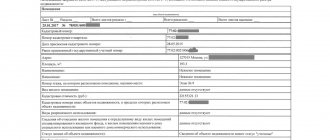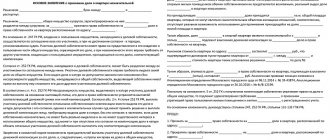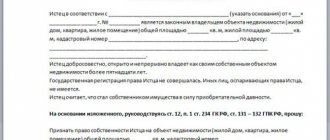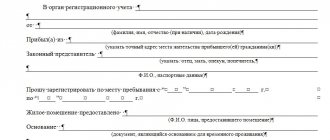General concepts
The property of a housing construction cooperative is one of the types of collective property. It assumes that participants unite on a voluntary basis to build an apartment building and its further use. The property of a housing construction cooperative includes:
- land plot;
- apartment house;
- additional building structures created at the expense of the cooperative;
- unit trust.
Types of orders
In addition to the main order, which gives the right to reside and use living space, there are other types of documents:
- Service - issued by the enterprise in which the employer worked and from which he received temporary housing. The validity period of the document was determined by the time of work in the organization or the length of service of the serviceman. This type of order gave the right to live in official housing.
- Temporary - could be obtained for a short stay in an apartment owned by an organization or executive committee. Its validity period is 30 days. Such an order was issued for the period of the session or the end of educational/work activity. Granted the right to live in a hostel.
- Inspection - provided so that a citizen could inspect the property and make a decision on settlement. As with other types of warrants, the inspection order contained the details of its recipient, as well as information about the living space. The documents were valid for 5 days and gave the right to inspect all types of real estate.
- Exchange - issued to conduct a transaction for the exchange of living space. A prerequisite for the exchange was the consent of the executive committee, which was in charge of the property.
Who is the owner of the cooperative?
The owner of a housing construction cooperative can be considered a person who:
- He is a member of the cooperative.
- He uses an apartment allocated by the cooperative.
- Paid the share contribution in full.
- If a citizen made payment of the contribution before marriage, then the apartment will be considered completely his property.
- If a citizen paid part of the share contribution, then got married, and after that the remaining part was paid, then the spouse in the event of divorce and division of property will claim a share. In this case, the share that was paid during the marriage will be subject to division.
- If a housing cooperative participant paid a share contribution while married, then both spouses will be the owners, even if one of the spouses is not a member of the cooperative.
What is an apartment warrant in 2021?
A warrant is a document that in the Soviet Union gave the right to move into and live in an apartment issued by the state. He signed out to the employer, i.e. to the person to whom the living space has been issued and who not only can dispose of it within the limits permitted by law, but is also responsible for its maintenance.
The warrant also indicated all persons who were registered at this address at the time of occupancy.
This is a tear-off document, one part of which was kept by the tenant, and the second - in the executive committee at the location of the property, where it was registered.
Registration of rights to an apartment
The owner of the apartment is the one who has paid the full share contribution , being a member of a voluntary housing construction association. This means that it does not need to be privatized. The owner will have the right to dispose of this property in the future, for example, when you want to sell the home, draw up a gift agreement, present the apartment as collateral when applying for a mortgage, but for this you will need to register the property.
Attention! It is recommended not to delay registration, since in the future there may be difficulties in collecting the necessary documents due to a change of chairman, reorganization of the housing cooperative, etc. How to get living space and become the legal owner?
To register property, you will need to collect a package of documents, including:
- Membership agreement in a housing construction cooperative.
- Share agreement.
- Certificate of payment of the entire amount of the share contribution.
- The act of acceptance and transfer of the property and technical documentation for it.
- All payment documents confirming the payment of the share.
- An extract from the minutes of the housing cooperative meeting on the transfer of ownership of the apartment to a member of the cooperative (more information about the general meeting of the housing cooperative can be found here).
- Identity document of the owner of the apartment or all owners.
- Receipt of payment of the state fee for registration of rights to real estate.
- Extract from the Unified State Register of Legal Entities.
- Certificate of marriage registration, if the applicant was married at the time of full payment of the share and written consent of the spouse.
Reference! If a housing cooperative has previously applied to the Office of the Federal Registration Service, for example, one of the residents has previously registered property, then the organization’s documents may not be provided. It will be enough to indicate the case number that contains these documents.
Next, you will need to contact Rosreestr, write an application in the prescribed form and pay the state fee. Registration will be carried out within 30 days from the date of application. Read about the types of applications to housing cooperatives, their execution and submission in our article.
How exactly does ownership of an apartment in a housing cooperative arise?
The basis for the emergence of ownership rights in a housing cooperative is paragraph 4, 218 of Article of the Civil Code of the Russian Federation, which states that a member of the community who has received the rights to an apartment in a housing cooperative can dispose of it in full.
And he can dispose of it, regardless of whether state registration or the registration procedure has been carried out.
The so-called cooperative ownership arises only because the shareholder has paid his share in full. The occurrence is protected by Russian legislation. However, you should not think that registration as such is not required. It is not just needed, it is extremely important and necessary. The payment of the share concerns only the moment of the creation of the property.
If the owner needs to sell the apartment, rent it out, or give it to someone as a gift, then he will definitely need registration with the registration authorities. If the tenant does not plan to make transactions, then he does not have to register his home. He will still own his apartment and live in it as long as he wants.
Rights and obligations of a member of a cooperative
When joining a cooperative and becoming an owner, a member of the cooperative has a question about his rights and responsibilities. Regardless of the size of the share contribution paid to the housing cooperative, the participant has the following rights:
- Use and dispose of your property.
- Maintain living quarters in proper order.
- Free access to your property.
- To participate in the management of the house.
- Participate in elections of governing bodies and be elected to them.
- Approve annual reports, participate in the adoption of income and expense estimates, approval of salaries for management and in drawing up the staffing table.
- Participate in the rental of non-residential premises of the cooperative.
- Make proposals for improving housing cooperatives.
In turn, the owner of a housing construction cooperative is obliged to:
- Comply with the internal regulations of the cooperative.
- Comply with technical, fire and sanitary rules for maintaining residential premises.
- Pay contributions towards repairs.
- Use common property objects only for their intended purpose.
- Eliminate at your own expense damage caused to other apartment owners or common property.
- Pay taxes and utilities (read about the formation and payment of payments for housing cooperative services here).
Important! All rights and obligations of both the housing cooperative itself and its owners are spelled out in the Charter, so before joining the cooperative you should not neglect to study the statutory documents.
Thus, the property of a housing construction cooperative includes both the apartment building itself, with all its residential and non-residential premises, and the land plot with all additional buildings on it. A participant in a housing cooperative can use the apartment allocated to him by the cooperative until the share contribution is paid in full. He will be able to become the owner of this apartment only after full payment of the share contribution.
All these provisions are clearly stated in the Housing Cooperative Charter, therefore, before joining, it is important to carefully study all the documents of the cooperative. This will allow you to avoid troubles while using the apartment.
Where are warrants for a municipal apartment in Moscow in the central district stored?
In 2011, she and her eldest son abandoned this apartment in favor of her younger son. read answers (2) Mother, daughter and grandson are registered in the apartment. My mother died not long ago, there is a warrant for a municipal apartment; the son is recorded on this warrant; read the answers (2) A warrant for a municipal apartment from a grandmother who is not a relative.
We recommend reading: Children are dependent on their parents
Law of the capital dated June 14, 2006 No. 29 “On ensuring the right of residents of the city of Moscow to residential premises” (as amended by the Moscow city law dated January 24, 2007 No. 2). Capital Law No. 21 of May 31, 2006 “On ensuring the housing rights of citizens during the relocation and vacancy of residential premises (residential buildings) in the city of Moscow” (as amended by Moscow City Law No. 67 of December 26, 2006).
How to issue a warrant for an apartment?
Currently, a residential premises warrant is not issued, so it will not be issued even if you receive council housing. Instead, a social tenancy agreement will be drawn up, one copy of which will be kept in the Housing Department of the local administration, the other - with the tenant.
If we are talking about a cooperative apartment, the order is not a certificate of payment of the share contribution. In this case, obtaining the right to own real estate occurs after full completion of settlements. After the new building is occupied, the cooperative will be re-registered as a HOA.
Is a warrant for an apartment a document of title?
The order did not have legal force until 2005, when the new Housing Legislation was adopted. Since the specified time, the document has lost its status and is no longer a document of title.
Instead, a social tenancy agreement is used, according to which the living space is transferred for use (Article 60 of the Housing Code of the Russian Federation), if we are talking about a non-privatized property.
If housing is the property of a citizen, this is confirmed by an appropriate certificate if the right arose before 2021 or an extract from the Unified State Register of Real Estate, if after.
How to restore a warrant for an apartment if it is lost?
If a document is lost or damaged to such an extent that its identification is impossible, it must be restored. To start the procedure, two conditions must be met:
- lack of a social rental agreement with the municipality;
- lack of a certificate of ownership of the residential premises.
To restore the order, you need to contact the Repair and Maintenance Company or the Housing and Maintenance Department of the building in which the municipal housing is located.
When contacting these authorities, you must take into account that a duplicate of the order is not issued, since the execution of this document is not provided for by the current housing legislation.
Thus, upon restoration, the employer will receive only an extract from the order, which contains the following information:
- date and place of issue of the document;
- data of the citizen for whom it was registered;
- information about the persons included in the order when it was issued;
- residential address;
- technical information about the property: floor, total and living area, number of rooms, etc.
This extract can be fully used instead of a warrant.
If information about the requested warrant is not found in the Repair and Maintenance Company and the Housing and Maintenance Department, the applicant is issued a written refusal to provide the document indicating the reason.
Next, you need to contact the municipal archives, present the refusal received and request archival information. If they are available at the appeal authority, the applicant also receives an extract from the order and uses it for its intended purpose.
If the requested information is not in the archive, you need to apply to the court with a petition to recognize the right to use the residential premises. The following must be attached to the claim:
- an extract from the apartment register confirming registration at the address;
- responses received during previous requests for order restoration.
Based on the results of the court hearing, the procedure for privatization of the property will be carried out or a social tenancy agreement will be drawn up.







